Have you ever wondered if there is a dog breed out there that combines playfulness and loyalty in the perfect balance? Well, the Bocker breed might just be the answer you’ve been searching for.
With its unique mix of Cocker Spaniel and Beagle, the Bocker is said to possess the best qualities of both breeds. But is this theory really true? Are Bockers truly as playful and loyal as they are claimed to be?
Well, let’s explore further and find out the truth behind this intriguing breed.
Key Takeaways
- The Bocker breed is a mixed breed dog resulting from Cocker Spaniel and Beagle breeds.
- Bockers are small to medium-sized dogs, weighing around 20 to 30 pounds and standing at 12 to 15 inches at the shoulder.
- Bockers are known for their affectionate and loyal nature, and they enjoy interacting with people and other pets.
- Bockers can adapt well to apartment living and are suitable for single seniors or families with children.
Origin of the Bocker Breed
The Bocker breed originated from the crossbreeding of Cocker Spaniels and Beagles. This unique combination resulted in a dog with a playful and affectionate nature, making them a popular choice for families and single seniors alike.
Bockers are generally small to medium-sized dogs, weighing around 20 to 30 pounds and standing at 12 to 15 inches at the shoulder. They can display various physical traits and colors, including black, brown, white, merle, tri-color, and bi-color coats.
Bockers have a strong desire to follow scents, so vigilance is crucial when it comes to their living environment. They thrive on playtime and interaction and are well-suited for apartment living.
Bockers can adapt well to households with multiple pets and are known for their loyalty and devotion to their owners.
Size and Appearance

When considering the Bocker breed, one can easily be captivated by their unique size and appearance. Bockers are generally small to medium-sized dogs, weighing around 20 to 30 pounds and standing at 12 to 15 inches at the shoulder. They can display various physical traits and colors, including black, brown, white, merle, tri-color, and bi-color coats. To help you visualize their appearance, here is a table:
| Size | Weight | Height |
|---|---|---|
| Small to medium-sized | 20 to 30 pounds | 12 to 15 inches at the shoulder |
Bockers are known for their playful and loyal nature, making them an ideal companion. So, not only will they catch your eye with their size and appearance, but they will also win you over with their affectionate demeanor.
Temperament and Personality Traits

Now let’s explore the temperament and personality traits of the Bocker breed, which will give you a deeper understanding of what makes them such wonderful companions.
Bockers are known for their friendly and playful nature. They’re incredibly affectionate and loyal, making them a great choice for families and individuals alike.
Bockers enjoy interacting with people and other pets, and they’ve a natural inclination to be social and outgoing. They’ve a playful energy and love engaging in activities and games.
Bockers are also known for their intelligence and adaptability. They’re quick learners and can easily adjust to different environments and living situations.
With their loving and joyful personalities, Bockers bring so much happiness and companionship to their owners.
Common Health Issues in Bockers
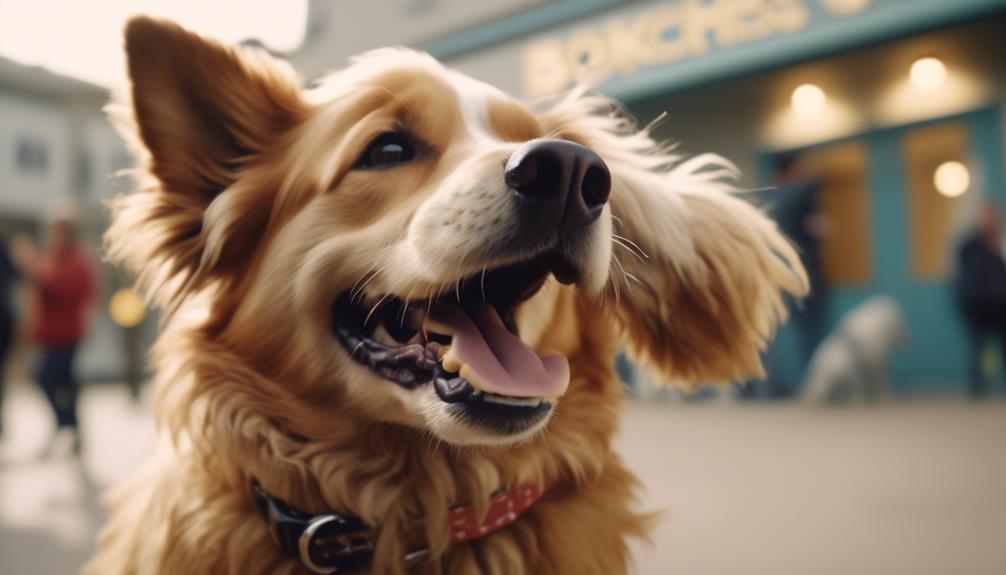
One of the important aspects to consider when owning a Bocker is being aware of the common health issues they may face. Bockers can inherit health problems from their parent breeds, the Cocker Spaniel and the Beagle.
Some common health issues in Bockers include eye problems, such as cataracts and glaucoma, which can affect their vision. They’re also prone to ear infections due to their floppy ears, so regular cleaning and maintenance are essential.
Heart disease, including mitral valve disease and congestive heart failure, can also be a concern. Additionally, Bockers may be susceptible to epilepsy, a neurological disorder that causes seizures.
It’s important to be proactive in monitoring your Bocker’s health and seeking veterinary care when needed to ensure they live a happy and healthy life.
Adaptability to Different Living Environments
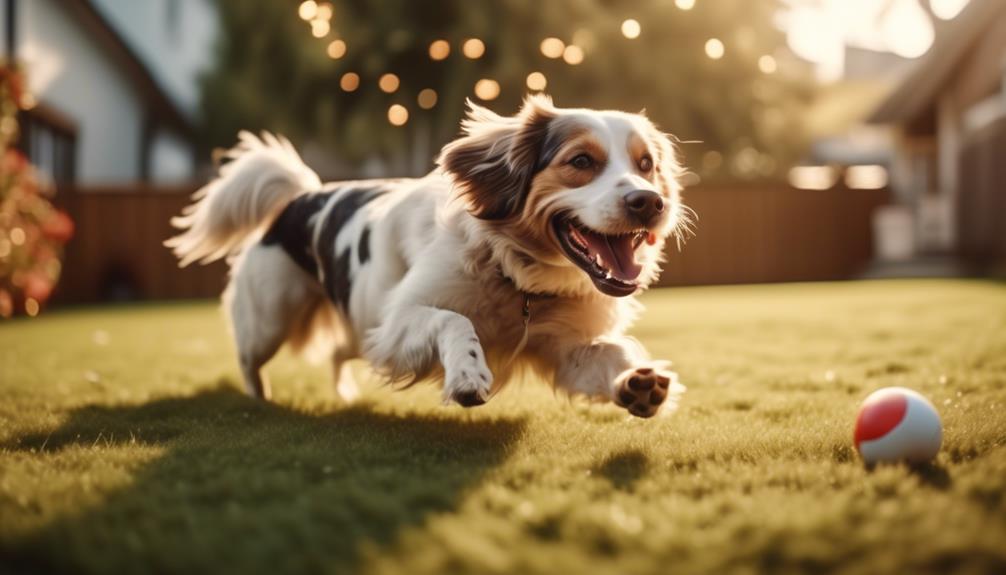
Bockers exhibit remarkable adaptability to various living environments, making them well-suited for a range of homes and lifestyles. Here’s a picture of their adaptability:
- Bockers can adapt well to apartment living, making them a great choice for urban dwellers.
- They’re suitable for single seniors looking for companionship or families with children seeking a playful pet.
- Bockers thrive on playtime and interaction, so a household with multiple pets would be ideal for them.
When choosing a dog for an apartment, factors like size, energy levels, and good manners towards neighbors should be considered.
- Bockers are adaptable to different weather conditions, making them suitable for various climates.
With their ability to adjust to different living environments, Bockers can bring joy and companionship to a wide range of homes and lifestyles.
Ideal Living Situation for Bockers
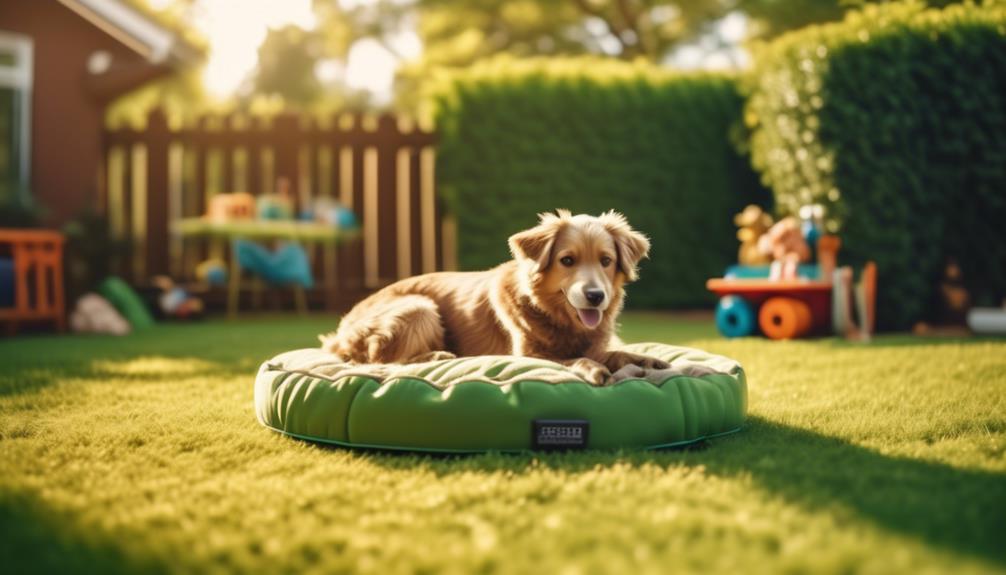
For the ideal living situation for Bockers, consider their adaptability and specific needs. Bockers can adapt well to apartment living, making them suitable for single seniors or families with children. They thrive on playtime and interaction, so a household with multiple pets is ideal for them.
When choosing a dog for an apartment, factors to consider include size, energy levels, space requirements, good manners, and polite behavior towards neighbors. It’s important to note that size alone shouldn’t be the sole determinant. Bockers have various energy levels and exercise requirements, so regular exercise is necessary to prevent weight gain and behavioral problems.
Additionally, regular veterinary checkups, grooming, and a proper feeding schedule are crucial to their overall health and well-being.
Factors to Consider When Choosing a Dog for an Apartment
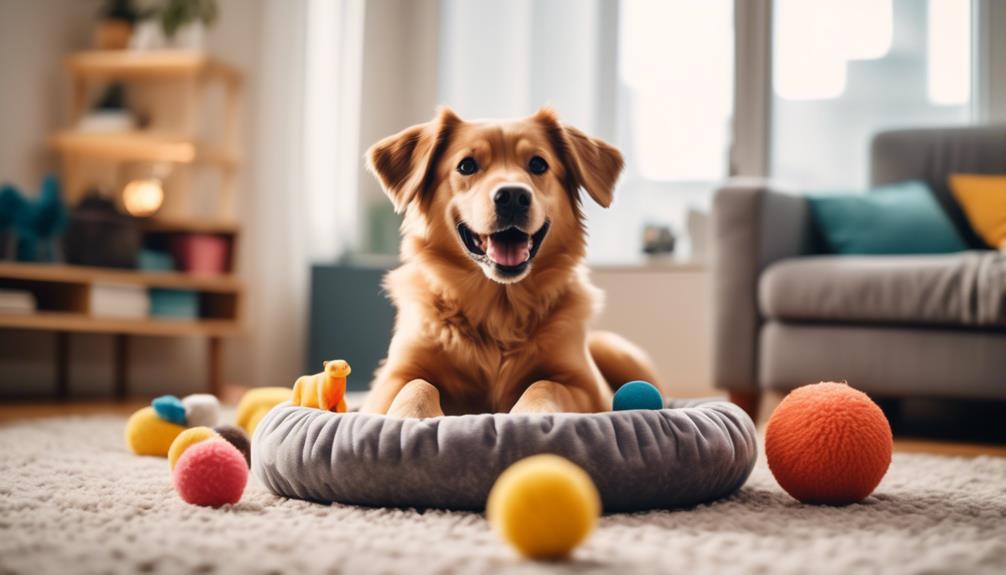
When choosing a dog for an apartment, it’s important to consider factors such as size, energy levels, and space requirements. Here are some key considerations to keep in mind:
- Size: Look for a dog that will comfortably fit in your apartment without feeling cramped or restricted.
- Energy Levels: Consider a dog with a moderate energy level that can adapt to your apartment lifestyle without needing excessive exercise.
- Space Requirements: Some dogs require more space to roam and play, while others are content with smaller living spaces.
- Good Manners: Choose a dog that has a calm and well-behaved temperament, as it will make apartment living more enjoyable for both you and your neighbors.
- Polite Behavior: Look for a dog that isn’t prone to excessive barking or howling, as this can be disruptive in close quarters.
Size Considerations for Apartment Dogs

Now let’s shift our focus to the important consideration of the size of a dog that’s suitable for apartment living. When choosing a dog for an apartment, size is a crucial factor to take into account. In a smaller living space, it’s essential to ensure that the dog can comfortably move around without feeling cramped.
Opting for a small to medium-sized dog would be ideal, as they require less space to roam and play. Additionally, smaller dogs tend to have lower exercise needs, making them more adaptable to apartment living. However, size alone shouldn’t be the sole determinant.
It’s also important to consider the dog’s energy levels, space requirements, and behavior towards neighbors. By carefully considering these factors, you can find a dog that will thrive in your apartment environment.
Behavioral Traits and Exercise Needs of Bockers
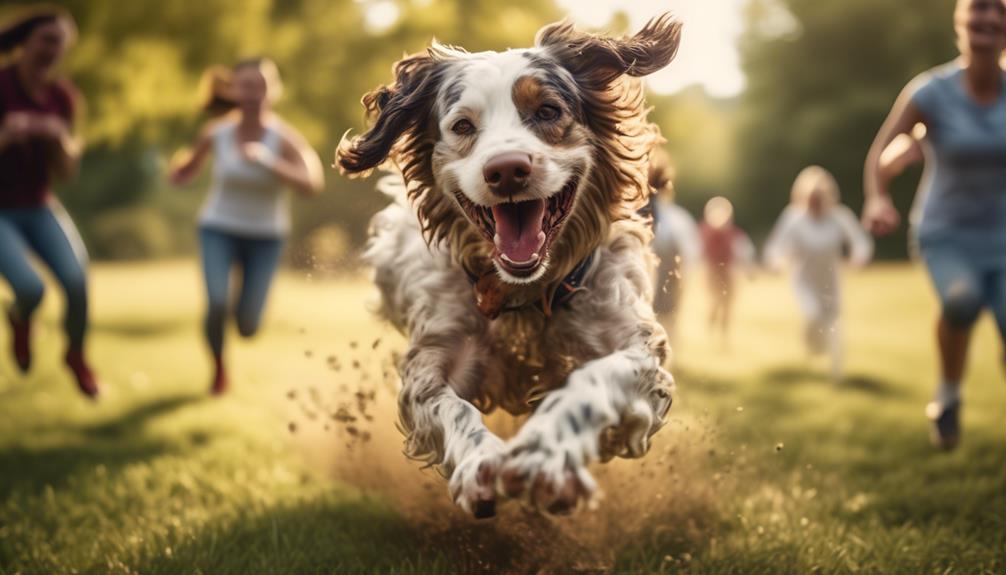
Understanding the behavioral traits and exercise needs of Bockers is essential for providing them with a happy and fulfilling life in your apartment. Here are five key points to keep in mind:
- Bockers can display playful and energetic behavior, requiring regular mental and physical stimulation.
- They have a tendency to follow scents, so vigilance is necessary during walks and outdoor activities.
- Bockers thrive in a household with multiple pets, as they enjoy social interaction.
- Lack of exercise can lead to weight gain and behavioral problems in high-energy breeds like Bockers, so daily exercise is crucial.
- Bockers may exhibit barking or howling tendencies, so proper training and socialization are important to curb excessive noise.
Dealing With Aggression and Excessive Barking
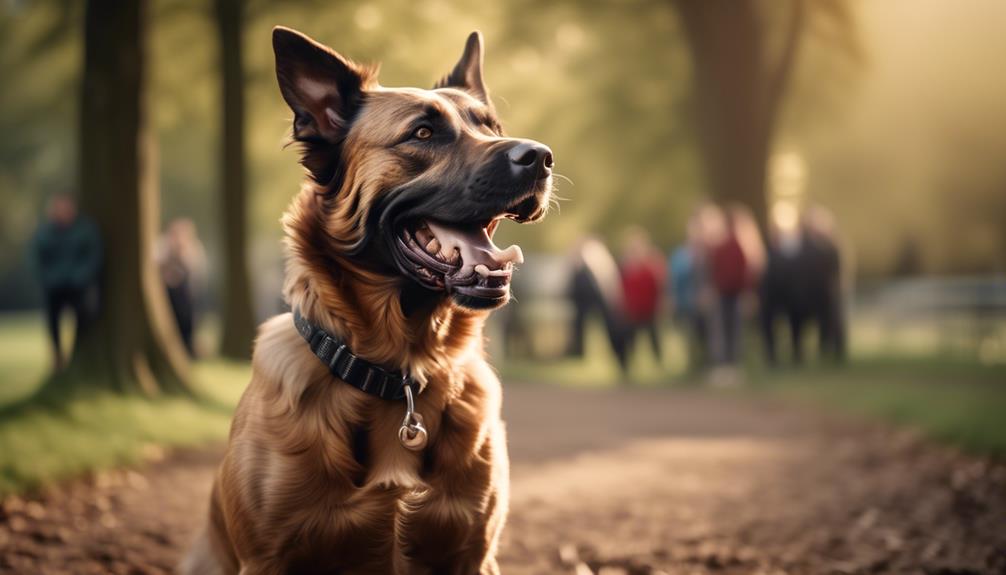
To effectively manage aggression and excessive barking in Bockers, it is crucial to establish consistent training and provide proper socialization from an early age. By setting clear boundaries and teaching your Bocker appropriate behaviors, you can help prevent aggression issues. It is important to expose your Bocker to various people, animals, and environments to ensure they are well-socialized. Additionally, addressing excessive barking requires understanding the underlying cause. Bockers may bark due to boredom, fear, or the need for attention. Providing mental and physical stimulation through interactive toys, regular exercise, and positive reinforcement can help redirect their barking behavior. Below is a table summarizing the key strategies for managing aggression and excessive barking in Bockers:
| Strategies for Dealing with Aggression and Excessive Barking |
|---|
| Establish consistent training routines |
| Provide proper socialization from an early age |
| Set clear boundaries and teach appropriate behaviors |
| Identify and address the underlying cause of barking |
Care and Grooming Tips for Bockers

Regular care and grooming are essential for keeping your Bocker looking and feeling their best. Here are some tips to help you maintain their health and appearance:
- Schedule regular veterinary checkups to monitor their overall well-being and address any health concerns.
- Keep an eye on their weight and provide them with regular exercise to prevent weight gain and promote a healthy lifestyle.
- Check their ears regularly for signs of infection or waxy buildup, and clean them as needed to prevent ear problems.
- Trim their nails regularly to keep them at a comfortable length and prevent them from becoming too long or causing discomfort.
- Establish a grooming routine from puppyhood to help your Bocker become comfortable with being handled, and brush their coat every other day to prevent matting.
- Bathing every few months with a mild shampoo will keep their coat clean and healthy.
Feeding and Nutritional Needs of Bockers

To ensure your Bocker remains healthy and thriving, it’s crucial to understand their feeding and nutritional needs.
Bockers have a moderate appetite and require a balanced diet to meet their energy requirements. It’s recommended to feed them high-quality dog food that’s appropriate for their age, size, and activity level.
As an active breed, Bockers may benefit from a diet that includes lean protein sources, such as chicken or turkey, to support their muscle development. Additionally, incorporating fruits, vegetables, and whole grains can provide essential vitamins, minerals, and fiber.
Remember to provide fresh water at all times and avoid overfeeding, as Bockers are prone to weight gain. Regularly monitoring their weight and adjusting their portion sizes accordingly will help maintain their optimal health.
Frequently Asked Questions
Are Bockers Good With Children?
Bockers are good with children. They are playful and affectionate, making them great companions for kids. However, it’s important to supervise interactions and teach children how to properly handle and respect dogs.
How Much Exercise Do Bockers Need on a Daily Basis?
Bockers need at least 30-60 minutes of exercise daily to keep them happy and healthy. Regular walks, playtime, and mental stimulation are essential. Remember, a tired Bocker is a well-behaved Bocker!
Can Bockers Be Left Alone for Long Periods of Time?
No, Bockers shouldn’t be left alone for long periods of time. They thrive on interaction and can become anxious or develop behavioral issues when left alone. They are best suited for households where someone can provide them with attention and companionship.
Do Bockers Have a Tendency to Bark or Howl Excessively?
Yes, Bockers may have a tendency to bark or howl excessively. It’s important to provide them with proper training and mental stimulation to help manage their vocal tendencies and prevent any potential behavioral issues.
What Is the Average Lifespan of a Bocker?
The average lifespan of a Bocker is around 10 to 15 years. They require regular veterinary checkups, exercise, balanced nutrition, and grooming to maintain their health and well-being throughout their lifespan.
What Makes the Bocker Breed Playful and Loyal Similar to the Bouvier Des Flandres Breed?
The loyal and versatile Bouvier breed is known for its playful and loyal nature, much like the Bocker breed. Both breeds are loving and playful, making them great companions for families. With their intelligence and trainability, they make loyal and obedient pets, bringing joy and laughter to their owners’ lives.
Conclusion
In conclusion, the Bocker breed is the perfect companion for those seeking a playful and loyal friend. With their affectionate nature and adaptable personality, they’ll bring endless joy to your life.
Just like a ray of sunshine on a cloudy day, the Bocker’s playful energy and unwavering loyalty will brighten even the dreariest of moments.
So, get ready to embark on a lifetime of love and laughter with your very own Bocker!




